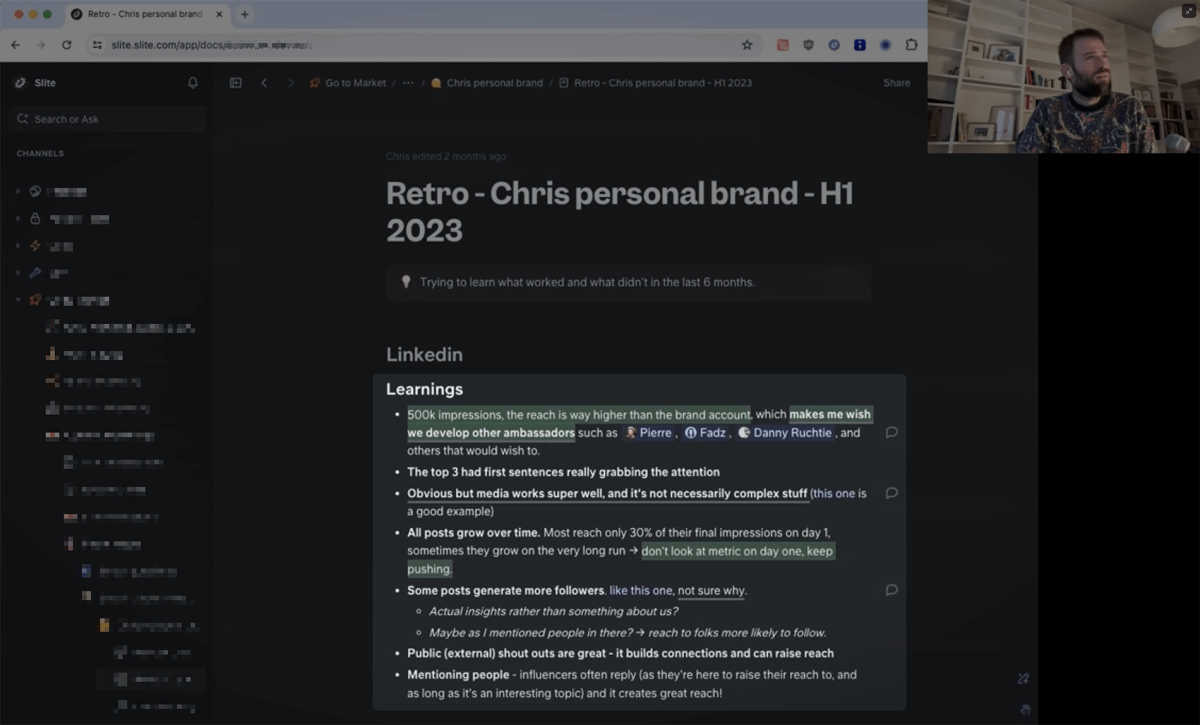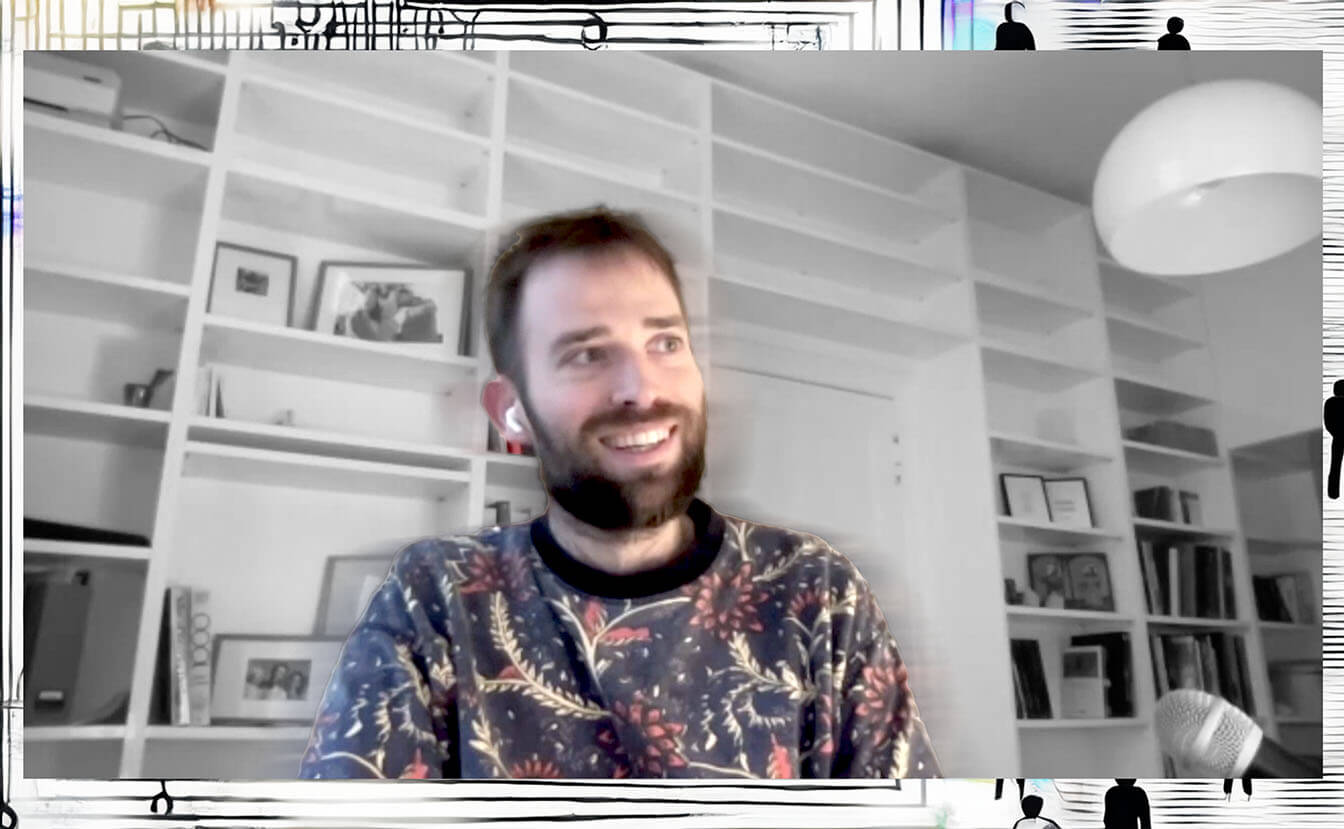A year ago, Christophe Pasquier, CEO and founder of Slite, made a critical decision: to transform his sporadic social media presence into a consistent, personal narrative about building a knowledge base on autopilot.
In this interview, Christophe reveals how he overcame initial reservations about posting regularly on LinkedIn, the impact it’s had on his business, and his process for generating ideas.
Editor’s note: We’ve lightly edited this interview for clarity and readability.
Watch the interview with Christophe on YouTube.
Tim: How would you describe Slite and your mission?
Christophe: We’re building a knowledge base for teams that is heavily powered by AI. Our goal is to create the first knowledge base that is self-running and on autopilot.
We aim to provide an extremely flexible tool that makes it easy to document all the knowledge in one place while using AI to automate the tedious parts of knowledge management, such as finding knowledge, detecting what should be cleaned up, improved, or removed.
How did the idea for Slite originate?
The original pitch for Slite wasn’t a knowledge base for teams. It started as a simple interface competing with Google Docs and Confluence, with the premise that just as Slack changed the way we communicate by bringing the UX of WhatsApp, we would change the way teams share knowledge asynchronously by bringing the UX of note-taking inside teams.
When we launched, our bigger customers were using it as a knowledge base. The real change came about a year ago when we realized that our users were utilizing Slite for various purposes, from project descriptions to meeting minutes, SOPs, handbooks, and wikis. Our added value was in the UX, ensuring that knowledge bases are not dusty books that nobody opens or cares about but rather a daily tool that teams actively engage with.
With AI, we had a significant aha moment where we realized we could do things that were previously impossible, such as improving documents in one click, applying style guides instantly, and allowing users to ask questions and get answers instead of searching through numerous documents. This led us to position ourselves as a knowledge base on autopilot.
Nice. And did you write very publicly about what you were doing from the beginning, or did you make a conscious shift to start sharing more publicly at some point?
It was quite conscious. I always shared occasionally, but the problem with that approach is that you don’t have much of a compounding effect. I’m not necessarily a writer, a native English speaker, or the best storyteller, so it used to take me a lot of energy to make it a habit.
Last year, we reached a stage with the team and product quality where I had more time to focus on other things. I looked back at what I had written and the impact it had, and decided that if I wanted it to be interesting, I needed to make it a habit; otherwise, it would be useless.
So, I gave it a real try. For the first six months of this year, I started with a checklist in my main document that I open every day. I created a backlog and forced myself to try posting at least two times a week, something genuine and interesting.
It led me to interact with nice people, to be in touch with my customers. It had a lot of side benefits, and I started seeing growth in followers. It’s still very early for me, but I do see a lot of side benefits. It’s actually very hard to measure, which is one of the biggest problems with this type of effort. It’s easy to measure the reach, but the actual impact on the business is harder to quantify.
How have you overcome the feeling that you can’t write well? Have you found some tricks to deal with that?
A few things. The first thing is impact. Looking at the results and seeing what works helps a lot.
Also, forcing myself to write regularly. It’s about forming a habit; you need to continuously do it. So I drop ideas all the time: some stuff that I would never publish, some stuff that I will publish. I also get a lot of things from the team. We have an updates channel where people can share.
There’s also a lot of potential in what we do. We ship a lot of incredible stuff that nobody knows about. There’s just this feeling that the team is doing so well, it’s a shame not to expose it and not to give this image to everyone that these guys are really thinking differently than others.
I do a lot on mobile to drop the ideas but never to write. In terms of actually writing the stuff, I have a default view where I prepare the posts. I need to prepare all of this when I have a calmer week. Then, I basically write a lot of them at once and even try to schedule them.
The other thing that works very well for me, which actually takes as much time, if not more, is video. If I do just a recording of myself going through the product, it’s a different type of content because, obviously, video is engaging, but at the same time, I’m showing a product. So if you don’t use Slite, maybe you will not care at all. But it gives me energy as well. It’s a bit less writing and a bit more interactive.
Is there any rule or process for deciding what goes out from your personal account and what goes out from the official Slite company page?
No, not at all. My rhythm for writing is so bad that if the marketing team asks me to write something — of course, for big launches or for something important, I will be there and I will be extremely active — but in general, I don’t follow the marketing rhythm.
I try to make it more and more human and personal, that’s the only way for me to make it work. I try to just remove the English mistakes and spelling mistakes. That’s the only thing that I worry about where I don’t think about improving everything.
Besides that, I don’t care if it’s not perfectly on brand. Also, part of our brand is being human in public, so it just fits with it. And I think people have a radar for everything that is too corporate or, I don’t know if it’s the right word, but too sanitized.
What have you found that works well, and what doesn’t work well for you or for your audience?
I’ll focus on LinkedIn because this is where I have some impact. The biggest things are big launches for sure, big announcements where we put in sweat and tears and people manage to detect that it’s actually something we really care about.
A lot of these posts are just me being excited, like “We are building the future of knowledge management with AI.”
Basically, anything that is about sharing exciting news works well. For example, the first day we managed to get Ask working, which is a feature where you just ask questions to your knowledge base. At the time, nobody had done it, especially not on private data. So that was big.
Another example is a picture of one of our sales team members from a long time ago when he was really young, so all the people that recognized him were having a laugh. It’s just a little chunk of our human story, so that works as well.
Then, I think anything negative has good impact. For example, I shared about somebody who sent a cold outbound invite to my calendar and then sent an email saying, “Hey, we had a meeting today.” That’s the worst kind of thing. So a very strong reaction, and I think everybody reacts to this kind of stuff.

What is your goal for next year, and how do you feel it’s time well spent?
At least at the beginning of the year, the question was: does it pay off? By being consistent, I did 67 times more on content performance on engagement, 75 times on reach or impressions, and I think it is 45 times more in terms of number of followers. So I can validate that recurrence pays off.
In terms of actual impact, I know it has impact by the weak signals I get, but I can’t size it. All I get is just very interesting LinkedIn conversations, very interesting profiles that I can reach out to, a lot of customers that I can connect to and engage with.
So I know that it’s positive, and it’s obviously one good way to put the Slite brand out there. But I don’t have more expectations than that.
So, for next year, I will continue — I’ll definitely try to do the same. I’m not putting it as a goal; I just hope to reach 10k followers if I continue. But sizing the actual impact on my business is too hard for me.
Is there anything else you would want to say to other founders who want to try out LinkedIn or founder-led content in general?
I do think that everybody should try it, but they should focus on being genuine.
I’m always looking at people like Enzo from June — I’m very impressed by the amount of work he puts into social media content. I have nowhere near the creativity and the care and the patience to do that. But at least he does share valuable content, which is very nice.
A lot of people do the same format, but with no essence. I would say don’t force yourself to do this kind of stuff.
We all know when we are pushing stuff that we don’t really care about. That would be the only thing — just be genuine. I think it can be fun. A lot of people see it as a tactic, but it can be very genuine and bring value.
Connect with Christophe on LinkedIn to follow his journey building Slite.
More Animalz interviews:
Founder-Led Content: Blitz-Scaling Social with doola’s Arjun Mahadevan
Founder-Led Content: How Skiplevel’s Irene Yu Turns Personal Experience Into a Growth Engine
Founder-Led Content: Lessons From Reclaim’s Henry Shapiro on Authentic Engagement
How Jess Cook Turns Content and PR into a Power Couple at Island
Why Megan Morreale Thinks Content Marketing As We Know It Is Dying (And What’s Next)
